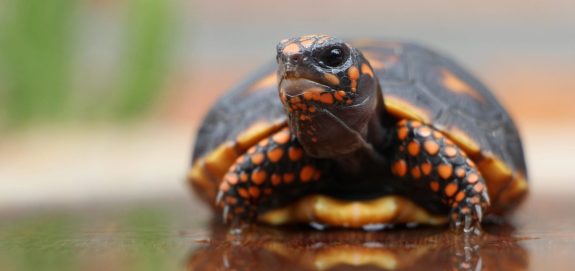A reptile zoo has been blocked from opening in Toronto’s Harbourfront Centre after city councillors heard concerns from scientists, community members, and animal protection groups—including Animal Justice and our supporters.
Reptilia, which already operates reptile zoos in nearby Vaughan and Whitby, applied for an exemption from Toronto by-laws that prohibit keeping alligators, large snakes and large lizards within the City of Toronto. Along with holding reptiles in tanks for entertainment, Reptilia also sells traveling reptile parties for kids. Keeping reptiles in captivity is disastrous for the well-being of these sensitive animals, and allowing people to interact with reptiles puts the public at risk of injury and zoonotic diseases.
Animal Justice lawyer Scott Tinney testified before a council committee, urging the city to safeguard the integrity of its exotic animal by-law and block the reptile zoo, due to serious animal welfare and public safety concerns. Animal Justice also sent an action alert, asking our advocacy network from the Animal Justice Academy to contact the councillors to voice their concerns as well.
Happily, Toronto rejected Reptilia’s application. This is incredible news for reptiles who suffer in captivity, and for the safety of the public. When people are exposed to exotic animals, they are at risk of contracting diseases, especially in the context of mobile zoos. Reptiles are also wild animals who may act aggressively when handled by strangers.
Captivity at zoos or in private homes is harmful to exotic animals like reptiles, whose complex needs can never be met in artificial environments where they are denied the chance to live life on their own terms. Reptiles are often solitary creatures by nature, and being gawked at by zoo attendees and touched by children can be especially stressful.
To make matters worse, many exotic animals like reptiles are also brutally captured from the wild and subjected to extremely stressful transport conditions before being sold to zoos or the exotic pet trade. Importing these animals can also bring dangerous zoonotic diseases across borders.
Ontario has the worst protections in the country for exotic animals, with virtually no prohibitions on ownership. In the absence of provincial leadership, it’s up to municipalities in Ontario to enact their own laws that ban the ownership of exotic animals. Toronto has strong and progressive exotic animal ownership laws, but those laws can only protect animals if they’re protected and enforced, and not undermined with exemptions for zoos.
Animal Justice is thrilled to see Toronto safeguard its exotic animal ownership by-law, and we’ll continue putting the pressure on Ontario to ban exotic animals province-wide.
Join the Animal Justice mailing list




